Church of God Ministry of Jesus Christ International
| Church of God Ministry of Jesus Christ International | |
|---|---|
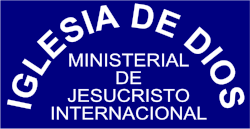 | |
| Orientation | Neopentecostal – restorationist |
| Leader | María Luisa Piraquive |
| Region | 50 countries/territories |
| Headquarters |
Bogota, Colombia, |
| Founder | Luis Eduardo Moreno, María Luisa Piraquive and María Jesús Moreno |
| Origin |
1972[1] Bogota, Colombia |
| Congregations | Over 900[2] |
| Aid organization | María Luisa de Moreno International Foundation |
| Official website | www.idmji.org |
The Church of God Ministry of Jesus Christ International is a Christian, neo-Pentecostal[3] and restorationist congregation. It was created in 1972 by the evangelical preacher Luis Eduardo Moreno, his mother María Jesús Moreno and his wife María Luisa Piraquive.[4] The Church has prayer rooms on more than forty countries and territories worldwide.[2]
The leader of the Church is the Colombian Christian female leader María Luisa Piraquive, while the current General Preacher is Carlos Alberto Baena.
History
Background
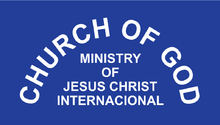
The origins of the Church of God Ministry of Jesus Christ International go back to the wandering of Luis Eduardo Moreno and his mother María Jesús Moreno through various christian denominations, where he served as preacher. After his marriage in 1966, his wife María Luisa Piraquive joined them.
Luis Eduardo had disagreements with the leaders of the various evangelical denominations in which he worked, due to the fact that he was pressed to give results in terms of growth of the churches at his charge.[5]
Beginning
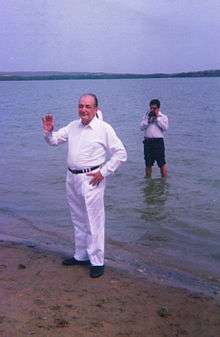
Disappointed by the permanent disagreements with the leaders of the denominations in which they congregated, the Moreno Piraquive family decided not to attend any church anymore and instead, they decided to pray at their house.
In 1972, during the prayers of a small group of four people congregated at the Moreno Piraquive family house, they allegedly experienced the first prophecy from God in the Church of God Ministry of Jesus Christ.[6] In such prophecy, God gave them the instructions about how to direct the church.
As time passed by the church expanded to other departments of Colombia. Currently it has prayer rooms in more than 300 Colombian municipalities.[2]
In 1997 is added the word International to the Church's name. As of 2015 the organization and its leader are under federal investigation by the United States federal government and the Colombian government for money laundering and drug cartel ties. [7][8]
Geographic distribution
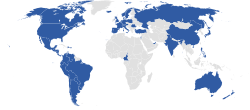

Besides the 50 countries and territories in which the church has prayer rooms, there are informal meetings held in Cuba and Equatorial Guinea.
| Continent | Region | Country or territory[9] |
| America | Central America | Costa Rica, El Salvador, Guatemala, Honduras, Nicaragua, Panama |
| North America | Canada, United States, Mexico | |
| South America | Argentina, Bolivia, Brazil, Chile, Colombia, Ecuador, Paraguay, Peru, Uruguay, Venezuela | |
| Antilles | Aruba, Curaçao, Puerto Rico, Dominican Republic | |
| Africa | Central Africa | Cameroon |
| Macaronesia | Canary Islands | |
| Asia | South Asia | India |
| West Asia | United Arab Emirates, Israel, Turkey | |
| East Asia | China, Japan | |
| South-east Asia | Philippines | |
| Europe | Central Europe | Germany, Austria, Belgium, France, Netherlands, Switzerland |
| Northern Europe | Denmark, Iceland, Norway, United Kingdom, Sweden | |
| Southern Europe | Spain, Italy, Portugal | |
| Eastern Europe | Poland, Romania, Russia | |
| Oceania | Australasia | Australia, New Zealand |
Spiritual gifts and prophecy
The Church's most important feature is its reliance on the gift of prophecy, in which a human instrument is said to be used by the Holy Spirit to speak. This practice reminds of the early Christian Church's gift of prophecy, mentioned by Paul in the Epistle to the Corinthians,[10] by John in his Gospel[11] and other New Testament books.
Unlike other Pentecostal denominations, prophecies are seldom general (i. e., given to the public attending the service), but individual, and refer to the past, present and future of the person receiving the message. Its form is of specific promises (of healing, happiness, economic prosperity, spiritual experiencies, marriage, and so on) expected to be fulfilled by God through his power, as well as commandments on the individual's life, as a "guidance for life". Those to whom the promises have been fulfilled often give testimony of them in public in the religious services.[12]
The gift of prophecy is not the only spiritual gift said to appear in the Church.[13] Of a central importance is the gift of tongues, which is the sign of being baptised by the Holy Spirit, resembling the New Testament's Pentecost day. There are also gifts of healing, spiritual visions, dream interpretation, casting away demons and discernment, among others. Believers are encouraged to ask for these gifts in prayer, so that all the congregation may have a personal experience with God. In a typical prayer room there could be one prophesier for each thirty believers.
Architectural style of the congregations
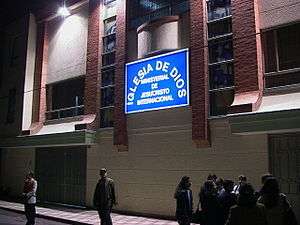
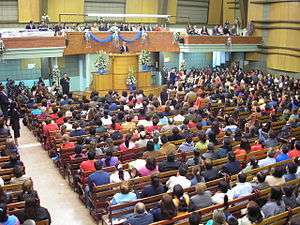
Initially, believers began to gather in living rooms of houses, with the Moreno Piraquive's house being the first prayer room in the La Estrada neighbourhood, Bogota. Later, the gatherings were held in the locality called Engativa. After some time it was necessary to rent warehouses, which were adequated for the religious services. By 1994 the church started to purchase properties in order to build prayer rooms for the congregation.[14] The church has also purchased former Jewish synagogues and evangelical temples.[3]
The first countries in which the church established prayer rooms, besides Colombia, were Panama and the United States of America. In some places of Florida and other countries, believers congregate in conference halls of hotels.
Baptisteries
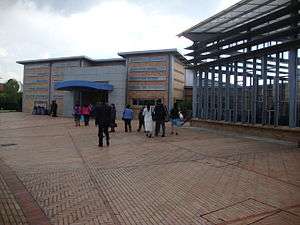
Besides using rivers, the sea or pools to perform baptisms, the church uses elementary baptisteries built in some of the prayer rooms.
The Baptistery of Cota was inaugurated on 29 May 2010 in the municipality of Cota in the Cundinamarca department of Colombia.[15] Its construction required an investment of more than 3 millions of american dollars. The baptistery of Cota was built on a 2 hectares property and has capacity for 800 people.[16][17] This building is used for the baptisms of new believers from the prayer rooms in Cundinamarca and Bogota.
Maria Luisa de Moreno International Foundation
In addition to its religious activities, the church offers social assistance (e.g. via educational programs and health services) in the countries in which it has presence, mainly in Colombia. One of the means through which the church performs this activities is the Maria Luisa de Moreno International Foundation,[18] a philanthropic institution founded in 2000 under the mottos "Help at all levels", "Architects of hearts" and currently "Helping is our work". This NGO is responsible for the distribution of food and the activities related to educational and social services.
The foundation operates in a dozen of countries, especially in Hispanic countries.[19]
Publications
The Zion International magazine is the official magazine of the Church of God Ministry of Jesus Christ International. It covers biblical topics and activities of the church. This magazine is published quarterly, written both in English and Spanish.
References
- ↑ CESNUR. "Le religioni in Italia" (in Italian). Retrieved 25 April 2011.
- 1 2 3 Numbers based on the locations page
- 1 2 "El Legado Histórico de la IDMJI". Revista Zion Internacional (6). 2011. ISSN 2216-0566.
- ↑ "History of the Church of God Ministry of Jesus Christ International". Retrieved 16 July 2015.
- ↑ Piraquive, María Luisa (2008). Experiences (1st ed.). Church of God Ministry of Jesus Christ International. ISBN 978-958-442472-3.
- ↑ (Piraquive 2007, p. 47)
- ↑ (Piraquive 2007, pp. 164–165)
- ↑ "Una mirada interna a la polémica iglesia de los Moreno Piraquive" (in Spanish). Retrieved January 16, 2014.
- ↑ The territories which are part of the countries in other continents are treated separately in the table.
- ↑ I Corinthians chapter 14.
- ↑ John, chapter 16, verses 7 to 15.
- ↑ Testimonies
- ↑ (Piraquive 2007, p. 177)
- ↑ (Piraquive 2007, pp. 89–91)
- ↑ Church of God Ministry of Jesus Christ International. "Baptisms in Bogota 29th of May 2010". Retrieved 10 December 2011.
- ↑ "Zion Internacional Magazine". January (1). 2011.
- ↑ "Church of God Ministry of Jesus Christ International – Baptistery Inauguration". Retrieved 31 March 2011.
- ↑ "El Congreso Magazine" (151). 2012.
- ↑ Maria Luisa de Moreno International Foundation. "Locations". Retrieved 28 March 2013.
Bibliography
- Piraquive, María Luisa (2007). Vivencias (Second ed.). Iglesia de Dios Ministerial de Jesucristo Internacional. ISBN 958-33-2658-5.
- Piraquive, María Luisa (2008). Experiences (First ed.). Church of God Ministry of Jesus Christ International. ISBN 978-958-442472-3.
External links
| Wikimedia Commons has media related to Iglesia de Dios Ministerial de Jesucristo Internacional. |
Official websites:
- Official website
- Online TV Channel
- Zion Internacional Magazine
- Website to promote multilingual cooperation
Official channels on Social Networks: